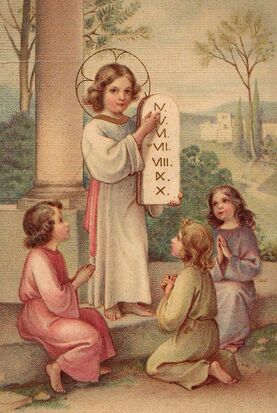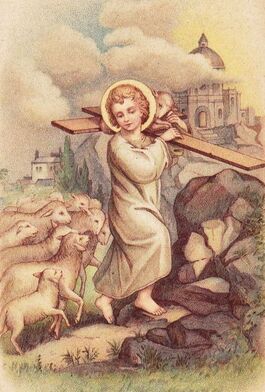
ON the journey of life you walk between truth and falsehood. There are holy prophets who strive to direct you in the right pathway; there are also false prophets who seek to seduce you and to lead you astray. To avoid these false prophets you must know them. This shall be easy for you, since you may judge them by their works. " By their fruits you shall know them."
First Point.—It is in your own heart and in your passions that you shall find the false prophets who are most to be feared. To those perfidious teachers these words of the Saviour are especially appropriate: "They come to you under the appearance of lambs, but within they are ravening wolves." What flatters us more than a passion? What is sweeter to us than its language or more seducing than its promises? Should you listen to it, it will give you happiness and glory—everything will be yours if you consent to open your heart to it and submit to its amiable empire. Thus it is that pleasure promises the sweetest joys. Envy shows us the humiliation of a rival as a most beautiful triumph. But if you are wise you will close your ears to the voices of these sirens, consider their effects, and then judge them.
We read in the Sacred Scriptures that a woman named Jahel, beholding Sisara hurriedly departing, recalled him by the most flattering words: "Come to my house; fear not, for I shall conceal you from the search of your enemies." Sisara returned at this invitation and at first was entertained splendidly. Jahel gave him milk to drink and clothed him with a beautiful mantle, and he slept in fullest confidence. But while he slept this perfidious woman drove a large nail in his head, and he perished a victim to his credulity. And this is what the passions do; they promise life, a happy life, to those who listen to them, but in reality they are the cause of death—at first the death of the soul by inducing to sin; and they often occasion the death of the body, for every one knows how pleasures, intemperance, impurity, and idleness produce a multitude of maladies and infirmities which abridge the life of those who indulge in them.
Sensual pleasures have all the attraction and sweetness of honey; we taste them without suspicion, and relish their delights; little by little, we sleep and forget God, our soul, and eternity. The habit of living only a material and sensual life becomes as the nail which binds us to the earth, and we are miserably lost. Guard well, therefore, against the voice of passions; learn to rule them, otherwise you shall become their slave; and what greater misfortune can there be than such a slavery!
Second Point.—The second kind of false prophet you should mistrust is the world, or rather the respectable worldlings. If you have to deal with men who are known as infidels or libertines, you will have less to fear, because you will be on your guard. But the men whom you are to question have a reputation for honesty and respectability, and it is this very morality which puts aside every suspicion. They come to you with a smile on their lips, and oh, how charming their language is! It has all the sweetness of honey. Youth must have its pleasures, and to interdict a young person from balls, theatres, and certain books is a species of cruelty! Religion must not exact privations which are beyond human strength! God has not created man to make him miserable, and to forbid him the pleasures of the world is to rob him of every happiness! This is the language of your respectable worldly man, this is what he will tell you, and such are the false prophets of whom you must beware. Judge of them by their fruits. And what are the effects of those books which your respectable worldling counsels you to read? They exaggerate the imagination, falsify the judgment, place the soul outside the limits of truth, and feed it with
chimeras. Romantic ideas, loss of time, forgetfulness of the most sacred duties, distaste for life, and, consequently, suicide—behold the fruits of those readings which some shall tell you are innocent!
With regard to the pleasures of the world, unquestionably they are not all equally criminal, but experience proves how sad, how disastrous they are to virtue. Distaste for piety, abandonment of prayer, hardness of heart, a spirit of vanity and of pride—behold the least consequences of those pleasures to which the world agrees! The distaste for piety and abandonment of prayer. How can we bring to prayer the recollection it requires on returning from a ball, when the senses and imagination are full of excitement from all we have seen and heard?
Hardness of heart. A person in the midst of the world, accustomed to the society of happy people, never dreams of the sufferings of the poor; if we behold misery, we turn our eyes away in disgust; and, besides, vanity absorbs our resources to satisfy the demands of style and dress, and we never have anything to give to the poor. Be on your guard, therefore, against the world, its maxims, its examples, and especially its pleasures; never forget that one cannot serve two masters; you must stand for virtue or vanity, for God or the world.
Third Point.—The third kind of false prophets which you should mistrust is composed of all the enemies of the Church. Here also the most dangerous are not the unbelievers. They do not come under the shepherd's staff, they do not dissemble, and on that account it is more easy for you to be on your guard against their impious words. Heresy is more to be feared because it conceals the poison of error under the appearance of truth. It is not inclined to show itself such as it is, or to uncover its designs and to plainly expose its thoughts. It strives to conceal and disguise and hide itself under the staff of the faithful shepherd. To hear some speak, you would think them the true children of the Church, wholly submissive to all her decisions. Equivocations are not their least defects. They place the Church where it seems good for them, and they recognize only those decisions which do not attack their errors. They appear to labor only for God, they call themselves His envoys, and promise to conduct souls to salvation. They support their doctrine by a certain regularity of life; their exterior is edifying and composed; but under a simple garb, under a mortified exterior, they conceal a spirit of fury and hatred, and carry destruction and division everywhere; they are the ravening wolves in the midst of the flocks of Jesus Christ. But the sheep should fly from them, avoid their assemblies, reject their books, and close their ears to their misleading discourses. As an excuse for your relations with the enemies of your faith, you say that you do not indulge in religious disputes. Now either this is to hold your salvation and your religion as worth but little, or you fail to distinguish two things most distinct. Without doubt, all the faithful are not obliged to enter into the depths of disputed matters between Catholics and heretics, but all should be on their guard, lest they give their confidence to false prophets, lest they follow a false doctrine, a doctrine condemned by the Church. This is a precept of Jesus Christ. If through want of this attention you are seduced or led astray, you can have no excuse. To say also that we should not judge any one is to misconstrue the words of Jesus, and to forget that in the same chapter where He forbids us to judge He commands us to be most attentive and watchful.
O my God, how many false doctors strive to mislead me, by preaching to me a doctrine and maxims which are contrary to Thy doctrine and Thy maxims. Save me, Lord, from the pitfalls which surround my pathway, and do not permit that I should ever cease to hear Thy commandments, Thou who art the Way, the Truth, and the Life.
Source: Short Instructions on the Feasts of the Year, Imprimatur 1897
Mary, Immaculate Virgin, Mother of God and our Mother, thou seest how the Catholic Faith is assailed by the devil and the world, that Faith in which we purpose, by the help of God, to live and die. To thee do we entrust our firm purpose of never joining assembles of heretics. Do thou, all holy, offer to thy divine Son our resolutions, and obtain from Him the graces necessary for us to keep them unto the end. Amen.






 RSS Feed
RSS Feed